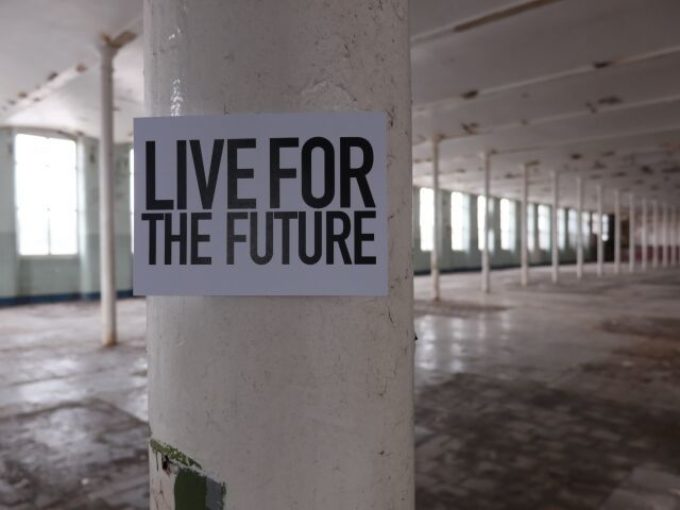
Zoe Svendsen, Director of METIS is currently in residence with us, creating her new work WE KNOW NOT WHAT WE MAY BE. The project explores the idea that to change the future, we need to imagine it collectively. Public workshops take place 14-20 February, details can be found here.
Can you tell us a little bit about your background and how you came to be working here at ACCA?
I came to be working on this project because from 2016 to 2017 I was an artist in residency at Attenborough Centre for the Creative Arts with the Cultures of Climate Change project, exploring future scenarios. It was an unusual kind of residency because instead of being based in a particular place instead it was a kind of network where we were encouraged to meet people all over the place, to talk about future scenarios. Having previously made a piece called World Factory, I was really interested in the way economics shapes the decisions that we make around green issues. By economics I mean everything from the organisation of money, to the price of things and services, and who gets to have what. Increasingly I’ve come to feel that the form of capitalism that we have currently won’t enable us to move beyond the carbon-dependent culture the West is addicted to - even though there’s an urgent necessity for it.
What are you currently working on with us here and how can people get involved?
From the research, I am developing an interactive system for engaging people in small-scale conversations about what kinds of things might be done and how as part of my research, I’m doing ‘research-in-public’, and on Tuesday evening (20 February) will be holding a conversation in the café with Peter Newell who is a Professor of International Relations - and whose book on globalization, the environment and capitalism I’m currently reading, and Andrew Simms (who co-founded the New Weather Institute, and worked for many years with the New Economics Foundation). Among other things, together they have created an incredibly inspiring pamphlet on the idea of Rapid Transitions, demonstrating the way that change is possible - and how we get used to new ways of doing things very quickly. I’m really excited to be asking them what they see as the most effective alternative economic structure for dealing with climate change - and I’ll be testing a new phase of the project with them, emerging out of workshops that took place last week.
How has the first workshop gone, any interesting outcomes so far? What is still to come over the next few days?
Last week we did a workshop with students from all over the university studying an absolutely impressive array of subjects, many to do with economics, development, sustainability and justice. It was incredible to have them in the room, engaging with the topics (and discussing from the perspectives of different disciplines). It was also very interesting to me to realise that their ideas, wishes, and solutions are not necessarily a million miles away from what a general public’s ideas might involve. Then the following evening, I held a café conversation in which Sue Riddlestone, of Bioregional, talked about their design of BedZED, the first large-scale zero carbon community (in London) - here was the dream in action.
What is increasingly clear, is that there are a series of common sense actions that would make it a whole lot easier for everyone to work together towards a faster, and more globally just, rebalancing of the planet’s ecosystems - and human relations to it. It wouldn’t be perfect, but at present things are clearly going very much in the wrong direction.
It would seem as though the idea of exploring ideas for how to create a better future wouldn’t be controversial, but interestingly it creates quite a lot of heat, coming from many different positions on the political spectrum. I am fascinated by this - and what the reasons for it might be…it shows that the project is really touching a nerve.
What do you hope to take away from your residency? How will the research feed into your new project, opening at the Barbican this year?
This time at ACCA has been immensely rich and rewarding - I’ve got a couple of performance studies students working with me this week to go into more detail on the ideas, and on Wednesday (21 February) there will be a drop-in time (2-5pm) for any other academics or interested students who want to share their thoughts/explore the project - people will be able to come and look around the studio and see what we are working on.
When making interactive work, it is impossible to make without involving potential audiences from really early on in the process - so these workshops are invaluable in enabling us to understand better the different kinds of engagements - and challenges - we face when dealing with this very directly political subject matter.
Thus the work here at ACCA will feed directly into the structure of WE KNOW NOT WHAT WE MAY BE which will open at the Barbican in early September 2018.